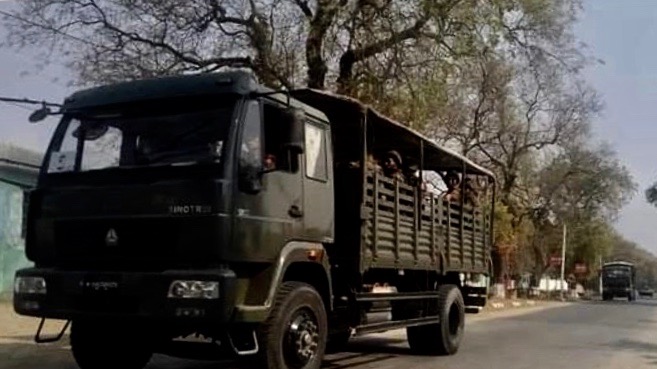The humanitarian crisis in Myanmar is worsening with over three million people in need of protection and assistance across the country, according to the United Nations Office for the Coordination of Humanitarian Affairs (UNOCHA). In addition to the ongoing direct and indirect violence, political instability, and spike in rights violations by the military forces, the ongoing COVID-19 pandemic is also having an adverse impact|.
On Thursday, August 26, a 40-year-old vendor was killed in indiscriminate firing by the military forces in Yangon region’s Mingalar Taung Nyunt township. At least 12 civilians were killed by the junta forces last week, including a 72-year-old man and a 10-year-old boy.
Since the military coup toppled the civilian government in Myanmar on February 1, at least 1,020 civilians have been killed by the military forces, according to the Assistance Association of Political Prisoners (AAPP). Over 6,000 people have been detained since the coup, with as many as 143 people detained just between August 14 and 24.
In addition to the mass arrest of activists, leaders and unionists, the Myanmar military led by Min Aung Hlaing has also being accused of committing war crimes in the form of using civilians as human shields.
Between August 13 to 18, the junta’s divisions 66 and 55 reportedly detained 30 civilians from Demoso, Hpruso and Loikaw townships in Kayah State and Pekon township in Shan State, and used them as human shields in different places, rights groups alleged.
The UNOCHA estimates that “about 3 million Myanmar people need humanitarian assistance and protection services.” In July, at least 16 aid organizations operating in the country issued a statement warning of a humanitarian catastrophe.
As a result of the political violence and conflict, as many as 336,000 people became internally displaced persons (IDP’s) in 2021, who require humanitarian assistance. Most of them are in protracted displacement situations in Rakhine, Kachin, Kayin, and Shan States.
The military coup has also led to serious implications for tens of thousands of garment workers, who continue to resist the military rule and have been participating in a months-long non-cooperation movement against the regime.
Activist groups including Industrial Workers Federation of Myanmar (IWFM) have repeatedly highlighted how the garment manufacturers and employers have collaborated with the military to identify and prosecute unionists, while largely ignoring the safety protocols required to combat the pandemic. As a result, a large number of workers have been infected with COVID-19. Two IWFM members died from COVID-19 this month, while more than 100 factory-level union leaders have been infected.
IndustriALL Global reported that “Myanmar’s labour office has been largely dysfunctional since the coup in February. Many garment employers have unilaterally dismissed workers who have been absent from work over safety concerns.”
“There are reports of employers violating labor laws and collective agreement, with reports of workers not receiving severance pay after dismissal, and employers closing down factories without properly consulting unions and workers,” IndustriALL said.
So far, a total of 375,871 COVID-19 cases have been reported in Myanmar, leading to 14,500.





